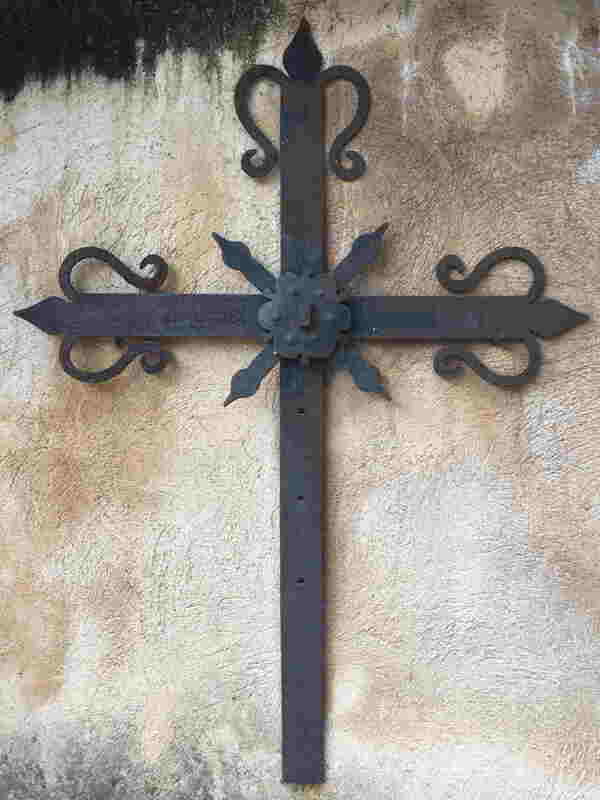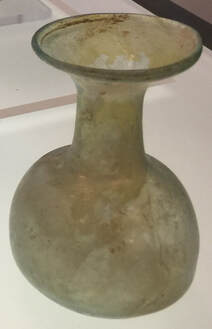|
"For all who are led by the Spirit of God are sons of God. For you did not receive the spirit of slavery to fall back into fear, but you have received the Spirit of adoption as sons, by whom we cry, "Abba! Father!" The Spirit himself bears witness with our spirit that we are children of God..." (Romans 8:14-16).
This week I was again at a familiar small business in my neighborhood. It is owned by a Mauritanian (West Africa) businessman. I decided it was time to engage in conversation with the young man attending the register, especially as there were no other customers in the store. On another occasion I had asked him where he was from, to which he responded, "Mauritania." This is one of the least reached with the gospel countries in the world! He came to Philadelphia at age 16. So I asked, "What is your name?" He said, "Abdullah." I responded, "Oh, you're a Muslim." He said, "Yes, I grew up a Muslim." I asked, Have you ever learned about another religion?" He answered, "No, I've never had the opportunity to. All I have known since growing up from small is Islam." "Do you attend one of the mosques in this area?" "No, I go to one at 57th and Baltimore." I inquired, "Why don't you go to one nearby here?" "I go to the one near my house. I live over there," he responded. "Oh, I thought you were the son of the owner." With a bit of a pause he responded, "No, he is a relative, my cousin." I asked, "Are you in school?" "No, but I want to attend the CCP (Community College of Philadelphia)." "What do you want to study?" "Medical science. But if that doesn't work out, I want to study to be a pilot." "Nice. Sounds great. I hope it works out for you." Now I took my opportunity to bear witness. "Abdullah means 'slave of Allah,' right?" He nodded his head in agreement. "You know that you can be set free from being a slave of Allah to being his adopted son instead? You can actually be a friend of God, just like Abraham was 'the friend of God.' You can have a close relationship with God." He looked a bit surprised, but interested. I continued, "We are all sinners, slaves of sin, Satan, and fear of death. Our sin separates us from God." Abdullah responded, "Yes, 'Isa was a perfect man, with no sin." "Right. No one else in the world has been without sin. But through 'Isa al-Masih (Jesus Christ) we can be set free. We can become sons of God, having a close relationship with God. Through faith in the death and resurrection of 'Isa al-Masih we can have new life and be born again." He looked curious. So I went on, "Have you ever read the Bible, the Taurat (Torah), Injil (Gospel)?" He replied, "Yes, I have started to. I listen to it." I was encouraged. "Great. Keep doing that. I encourage you to read one of the Gospels about the life and teaching, death and resurrection of 'Isa." Signing off I said, "Nice talking to you. See you again soon. I'll be praying for you." Will you pray for Abdullah, too? I am hoping to be able to continue the conversation....
1 Comment
A notable point concerning commonalities between the Qur’ān and the Bible is the clear influence of the Bible in the development of Islām. Every surah has some allusion or reference to it, so the Qur’ān depends upon the biblical knowledge of its audience.[1] Some of these influences may be seen in Judaism and the perspective of Syrian Nestorian Christianity. Muhammad had contact with a Nestorian monk in Damascus on his caravan expeditions, and in A.D. 631 in Medina with a delegation of sixty Christians from Najran, near Yemen, with whom he made a treaty after a debate.[2] Some qur’ānic stories are a recasting of biblical accounts in new settings as an “identification technique” of placing stories in the reader’s setting, such as Ibrahim and his son Isaac moved from Canaan (Palestine) to Mecca in the Ḥijāz.[3]
There are numerous extra biblical influences upon the development of the Qur’ān. The addition to the biblical account of Ibrahim and Ishāq building the house of God is borrowed from Syrian Jacob of Serugh (451-521),[4] with Islāmic tradition changing the son to Ismā’īl. Another example, Surah 5:32 comes from the Jewish Mishnah (redacted around A.D. 250) which says, “Whoever destroys a single life is considered by Scripture to have destroyed the whole world, and whoever saves a single life is considered by Scripture to have saved the whole world.”[5] The account of Abraham being saved from Nimrod’s fire is scattered in various qur’anic passages[6] and Tradition.[7] It originated in the ancient Jewish book called Midrâsh Rabbâh. Zoroastrian influence upon the Qur’an came from Salman Farsi from Persia, who was raised “as a Zoroastrian and became a magus scholar in that religion. Becoming disillusioned with his religion, he converted to Catholicism in Syria. Upon traveling from Syria to Arabia he was captured and sold as a slave in Medina. After the hijra[8] to Medina, Muhammad freed him from slavery, he became a Muslim, and they had many conversations through which he became a significant figure in Islam, including suggesting building the ditch for defense of Medina. Many parallels can be made between Muhammad and Zoroaster.[9] Muslims claim that to rightly interpret the Qur’ān, one must have the Hadith [“news”; Muhammad’s sayings] and Sunnah [traditions and practices]. As Maryam Jameelah explains, “…a proper and detailed understanding of Holy Quran is not possible without some knowledge of the relevant Hadith, for how can the Holy Text correctly be interpreted except by the Prophet to whom it was revealed? Those who disbelieve the Hadith also disbelieve the Qur’ān for its revelation explicitly tells us that one cannot follow what God wants us to do without an unquestioning acceptance of the authority of the Holy Prophet Muhammad (peace and blessings of Allah be upon him).”[10] Thus Tradition as a source of authority for the Muslim is endorsed by the following hadith: Abu Bakr as-Siddiq said, “I will not leave anything Allāh’s Messenger (ﷺ) did, because I am afraid that if I left something from his tradition, then I would go astray.”[11] The Hadith are used to interpret the Qur’ān and provide context as to when and under what circumstances the revelations were given to Muhammad. It is believed that through inner revelation by divine inspiration, Muhammad provided specific application by example to the broad principles found in the Qur’ān. Many allusions to things in the Qur’ān are elaborated upon extensively through generations of the oral development of the Hadith over about 120-290 years. The Hadith grew as new situations were encountered to which new teachers sought to give qur’ānic application. In practice, living by the Hadith and Sunnah of the Prophet takes on a larger role for the average Muslim than the Qur’ān, despite the Qur’ān being the first source of authority. References: [1] See Gabriel Said Reynolds, The Qur’an and the Bible: Text and Commentary (New Haven: Yale University Press, 2018). [2] Craig Considine, ‘Pluralism and the Najran Christians: How Prophet Muhammad Went Beyond Tolerance,” Huff Post (02/17/2017); https://www.huffpost.com/entry/pluralism-and-the-najran-christians_b_9235554 (accessed 11/01/2020). [3] Miriam Lindgren Hjälm, “The Qurʾānic Subtext of Early Arabic Bible Translations,” Biblia Arabica; https://biblia-arabica.com/the-qur%ca%beanic-subtext-of-early-arabic-bible-translations/ (accessed 5/26/2020). [4] Joseph B. Witztum: “The Syriac Milieu of the Quran: The Recasting of Biblical Narratives.” Ph.D. dissertation submitted at Princeton University, 2011, 168. [5] “The Origins of the Precept ‘Whoever Saves a Life Saves the World,’” Mosaic (October 31, 2016); //mosaicmagazine.com/observation/2016/10/the-origins-of-the-precept-whoever-saves-a-life-saves-the-world/ (accessed 7/8/2020). Targum of Jonathan ben Uzziah; also, the Targum of Jerusalem. [6] Surah 2:260; 6:74-84; 19:42-50; 21:52-72; 26:69-79; 29:15, 16; 37:81-95; 43:25-27; 60:4. [7] Qissas al Anbia and Arâish al Majâlis.; Abdul Feda, Ancient History from the Mukhtasar Fi Akhbâr il Bashar. [8] “hijra” –after 13 years of preaching in Mecca and suffering persecution from the pagans, Muhammad was invited to become a leader in Medina. He migrated with some of his followers in A.D. 622. This is the year of the start of the Muslim lunar calendar. [9] Shayesteh, Daniel. Islam and the Son of God. Sydney, Australia: Talesh Books, 2004, 2010), 15-19. [10] Maryam Jameelah, Islam Versus Ahl-Kitab Past and Present (Sant Nagar—Lahore, Pakistan: Mohammad Yusuf Khan, 1968), xxiii-xxiv. [11] Sahih al-Bukhari, 3092, 3093. This past week I have been thinking about a contrast between the spirituality of Muhammad and that of Christ. There are many ways in which they can be contrasted, but this past Sunday our text was John 12:1-7, in which Jesus had been invited to dinner at the home of Lazarus, whom he had recently raised from the dead. While Jesus was eating dinner with his friend Lazarus, while his sister Martha served, his sister Mary approached Jesus and poured out a flask of pure nard ointment upon his feet. This nard, imported from the Himalayas in India, was likely a family heirloom worth a year’s wages. Then in humility she proceeded to wipe his feet with her hair, as an act of worship. The whole house became filled with the sweet fragrance of the ointment. She fully recognized who Jesus was as the Son of God. For who else could raise her dead brother? He had been dead for four days when Jesus raised him up. By then his body was already decaying with a strong stench (John 11:17, 39). Yet, Jesus restored his life to full health and cleanness, having just declared, “I am the resurrection and the life” (John 11:25). Mary’s action also illustrates the contrast of death, the result of bondage in sin and to Satan, and abundant life and freedom found in Christ.
Judas, the money keeper and thief, who denounced Mary’s sacrificial act, was under Satan’s control. He did not really care about giving the value of the nard to the poor. Jesus declared that Mary’s action was to prepare him for his soon approaching burial, as it was the custom to prepare a body for burial with ointment and spices. Nard is a gentle aromatic relaxing sedative which has anti-bacterial properties. Mary had sat at the feet of Jesus to listen to him and understood his approaching death for her sins and the sins of the world. In contrast, Muhammad denied that Jesus died on the cross. It only appeared to be so. Some hadith speculate that perhaps it was Judas who was crucified and made to look like Jesus. For how could Allāh allow his prophet to suffer shame and defeat through a cruel death? In denying Jesus' death, Muslims also deny his burial and resurrection. So, there is no need for Mary’s sweet aroma of nard poured out in worship. Muhammad would have agreed with Judas. Both denied his deity and being a Savior from sin’s condemnation. For Muhammad many acts can free one from one’s sins, including coming to pray salāt on Fridays in the mosque, especially if you are among the first to arrive. In addition, one should bathe oneself and put on perfume before going to Friday prayer (jumu'ah). Muhammad was obsessed with perfume, so many Muslim men wear lots of after shave regularly. His vision of heaven (janna) is not a place to live in the presence of Allāh. Rather, it appealed to the three primary physical interests of Muhammad of food, women and perfume. Apostle Paul describes his inability to understand: “The natural person does not accept the things of the Spirit of God, for they are folly to him, and he is not able to understand them because they are spiritually discerned” (1 Cor. 2:14; ESV). Upon my visiting the ancient cave churches in the Ilhara Valley in Cappadocia, Turkey there were two signs pointing to one of the carved-out churches in the soft rock valley wall with fresco icons partially destroyed by Muslim iconoclasts. One sign pointed to the “Odorous Church,” while the other pointed to the same saying “Fragrant Church.” This illustrates the contrast in understanding of the gospel between the two religions. As Paul expresses it, “For we are the aroma of Christ to God among those who are being saved and among those who are perishing, to one a fragrance from death to death, to the other a fragrance from life to life” (2 Cor. 2:15-16). Now that we have been given the Spirit of life, we spread the aroma of Christ throughout the whole house wherever we go by our words of faith and acts of love. “But thanks be to God, who in Christ always leads us in triumphal procession, and through us spreads the fragrance of the knowledge of him everywhere” (2 Cor. 2:14). |
Archives
March 2023
Categories |







 RSS Feed
RSS Feed
